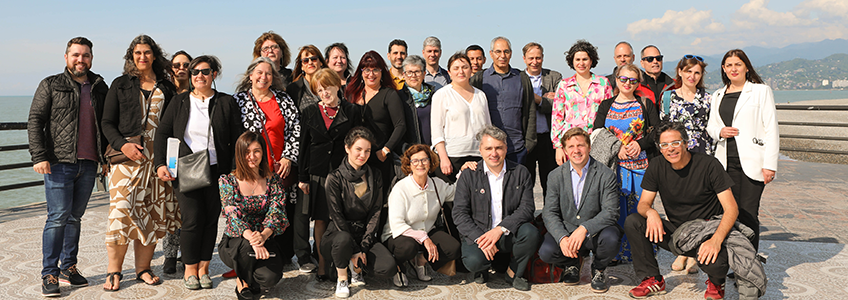The Fundación Universitaria Iberoamericana (Iberoamerican University Foundation) (FUNIBER)took part between May 15 and 17 in Batumi (Georgia) in the closing conference and subsequent final meeting of the Erasmus Plus project LOVEDIST@NCE.
The conference was also attended by the rest of the project partners: Instituto Politécnico do Porto ( Portugal); Technical University of Cluj Napoca (Romania); Ilia State University, Telavi State University, and Batumi Shota Rustaveli State University (Georgia); in addition to Inter-University Center for E-Learning (IUCEL), Ono Academic College, and Academic College Levinsky-Wingate (Israel).
During the first day of the event, the results and experiences of the pilot courses developed by the participating Israeli and Georgian institutions were presented.
The teachers from Israel explained how Social-Emotional Education (SEL) was implemented in their programs, which is aimed to foster social and emotional skills, as well as Universal Design for Learning (UDL), a system that focuses on the student, allowing him/her to decide how he/she wants to learn through different educational formats.
ONO Academic College professors explained how they conducted a course through a podcast format and the subsequent feedback they received from students. “My experience is both positive and negative because the podcast is interesting and fun to listen to, but at the same time, remembering the material is difficult,” remarked one of the students through an anonymous survey after the completion of the course.
In addition, emphasis was placed on online faculty mentoring. “I hope that other teachers will not feel alone in this process,” said Naama Katz, who has taught at ONO Academic College for more than 15 years.
Georgian institutions also showed their results, highlighting the structural problems and challenges of higher education in the country. Specifically, the lack of connectivity, Internet connection problems, or the absence of online study habits, among others, were some of the drawbacks mentioned by the teachers.
During the second day of the final conference, several workshops were organized by FUNIBER, the Instituto Politécnico do Porto (Portugal), and the Technical University of Cluj Napoca (Romania). The Foundation’s workshop focused on gamification in education, a methodology that incorporates elements of game design to take advantage of them in the educational context.
Students also played an important role on this day, with a round table focused on distance education.
Finally, on Wednesday, May 17, the final meeting of the consortium was held to evaluate issues related to the preparation of the final report, the sustainability of the project, and the possibility of future collaborations.
The Erasmus Plus CBHE LOVE.DIST@NCE (Learning Optimization and Academic Inclusion Via Equitable, Distance Teaching and Learning) project aims to contribute to improving access to and quality of higher education for socially vulnerable people in Israel and Georgia, and is funded by the European funding agency EACEA (Education, Audiovisual and Culture Executive Agency).

Disclaimer: The European Commission’s support for the preparation of this publication does not constitute an endorsement of its contents, which reflects the views only of the authors, and the Commission cannot be held responsible for any use which may be made of the information contained therein.
